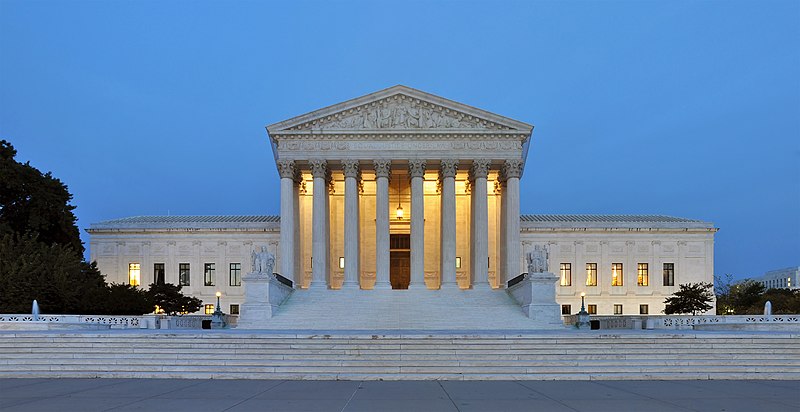Today the Supreme Court of the United States (SCOTUS) will hear oral arguments in Espinoza v. Montana Dept. of Revenue, a case that could have massive consequences for hundreds of thousands of K-12 students across the country — and might even lead to changes in several state constitutions.

United States Supreme Court Building by Joe Ravi, Wikimedia license CC-BY-SA 3.0
The case centers on three families participating in Montana’s tax credit scholarship program, a policy that gave tax credits to people who donated to scholarship organizations, organizations which could then help low-income students pay for private K-12 schools, including private religious schools. However, the Montana Department of Revenue issued a rule stating that scholarships could not be used at religious schools, and later the Montana Supreme Court ruled that any aid to religious schools violated part of their state’s constitution, specifically a provision against public funding for “sectarian schools,” commonly known as a “Blaine Amendment.” Eighteen other states already have similar tax credit scholarship programs and 37 states have some form of Blaine Amendment.
The three families, in partnership with the Institute for Justice, now have the chance to make their case before SCOTUS. The parents are arguing that their right to free expression of religion was violated by the ruling in Montana. The other side argues that funding any private school — religious or not — was unconstitutional at the state level and that overturning the state’s tax credit scholarship program did not lead to any violation of free expression. (SCOTUS started to define how state governments might provide funding to religious schools under the Constitution beginning in the 1970’s with Lemon v. Kurtzman and has been refined through subsequent cases, like Zelman v. Simmons-Harris in 2002 and Trinity Lutheran v. Comer in 2017.)
The upcoming ruling in Espinoza may be yet another step towards articulating the relationship between state funding, parents’ choices, and religious providers of K-12 education. Some observers, including teachers unions, are hoping for either a ruling in Montana’s favor or a narrowly-scoped ruling for the parents, which might not lead to significant policy changes in other states. School choice fans view this case as an opportunity to strike down Blaine Amendments everywhere, opening the doors to more tax scholarship programs.
If every Blaine Amendment is struck down, it could very well lead to a Kuhnian paradigm shift in how we think about providing K-12 education. The modern debate around school reform began nearly four decades ago with the publication of “A Nation at Risk.” In the years that followed, school reform efforts tended to focus on the “what” (standards) or the “how” (instruction/governance) of education, but often failed to give equal weight to the “why” — the values that serve as the foundation of any school community. If states empower more families to pursue private school options, they will not only seek schools that can help their kids develop knowledge and skills, but also impart the faith-motivated values that can build character and purpose in life, something that is difficult to achieve in a public school setting.
Simply put, the ruling in Espinoza could be a watershed moment for the school choice movement if SCOTUS strikes down Blaine Amendments. Given recent rulings like Trinity Lutheran and Masterpiece Cakeshop, the end of Blaine Amendments is looking more likely.
Kathleen Porter Magee recently advised education reformers: “As we work together to drive continued improvement and systemic change, it’s worth looking beyond easy-to-replicate programs and practices to the foundational values and beliefs that help schools build the habits and skills that serve young people long after they graduate.” In a post-Espinoza world where public funds could flow more freely to private religious educational institutions, that challenge may be more relevant than ever.